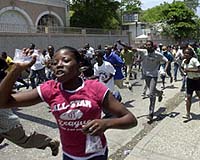 |
Tana River Delta, Kenya (AFP) July 19, 2009 On the fertile lands around Kenya's longest river, a battle is raging -- between farmers, conservationists and investors keen to turn the rich soil into swathes of commercial farmland. The 800-kilometre (500-mile) Tana river sustains a rich biodiversity and thousands of residents who rely on it for fish and on its sedimentary deposits for farming and pasture. In December the residents won a court injunction temporarily halting the country's biggest sugar company, Mumias, from growing cane there for biofuel, but the case has since stumbled on legal technicalities. With the case still unresolved, Kenya announced in December it was planning to lease 40,000 hectares (100,000 acres) of land near Tana to the Gulf state of Qatar to grow fruit and vegetables in exchange for the construction of a port, road and railway. Despite the potential revenue that the projects can generate, residents here reject the sugar firm's plan since it will displace 22,000 people and dry up the soil. "We can be evicted anytime... They would have to dry the area and all. What will be left for us will be our poverty," local resident Bernard Onyango, a fisherman from western Kenya who relocated to a village near Tana 15 years ago. Not only is the prospect of eviction a major worry, huge herds of cattle from the parched regions of northern Kenya that rely on the grassland around the delta will be starved of pasture during dry spells. "In absence of all that, where will they go? They have nowhere else to go," said Roba Albado, pointing to a small lake near his village. Maulidi Kumbi Diwayu, who heads a local environmental watchdog, said that if the projects are allowed to go on, the loss of pasture and land will lead to dangerous conflicts between humans and wildlife. "The cattle will have nowhere to go but the stretch of land between the river and the project," he said. "Crocodiles will be concentrated in the river, creating danger for cattle and human lives." Such tussles expose the sensitive question of land tenure in Kenya, where it is categorised as either government land, freehold or trust land. Government land is that which belonged to the British colonial government and was handed to Kenya's government after independence, while trust land is in the hands of county councils. Trust land is communal and the council holds it in trust for the benefit of its residents. Most of the Orma and Pokomo communities living in the Tana river delta do not have title deeds and a government agency claims ownership of the land, but locals say the land was handed to them by their ancestors. Among the few residents who have title deeds is Worede Dela, a village elder in his seventies who said he inherited the document from his ancestors. The deed was handed to the family in 1923 by the British colonial administrators, he told AFP. Little stands in the government's way to start projects in the rich delta except a slim chance that the area could come under the regulation of the 1971 Convention on Wetlands. The convention does not expressly ban large-scale agricultural use of wetlands but calls for the "conservation and wise use of wetlands and their resources." According to Judith Nyunja, an official with the state-run Kenya Wildlife Service, the convention could bar single-crop growing in wetlands such as the Tana river delta. Share This Article With Planet Earth
Related Links Farming Today - Suppliers and Technology
 Arab states in 'neo-colonial' food grab
Arab states in 'neo-colonial' food grabKuwait City (UPI) Jul 16, 2009 A Kuwaiti company partly owned by the emirate's sovereign wealth fund is preparing to join other Gulf states in buying up agricultural land in Asia, part of a global land grab to ensure food security. Unlike the governments and corporations in the Gulf that have been acquiring vast tracts of arable land, mainly in poor countries of Africa, Asia, Latin America and Eastern Europe, to ... read more |
|
| The content herein, unless otherwise known to be public domain, are Copyright 1995-2009 - SpaceDaily. AFP and UPI Wire Stories are copyright Agence France-Presse and United Press International. ESA Portal Reports are copyright European Space Agency. All NASA sourced material is public domain. Additional copyrights may apply in whole or part to other bona fide parties. Advertising does not imply endorsement,agreement or approval of any opinions, statements or information provided by SpaceDaily on any Web page published or hosted by SpaceDaily. Privacy Statement |